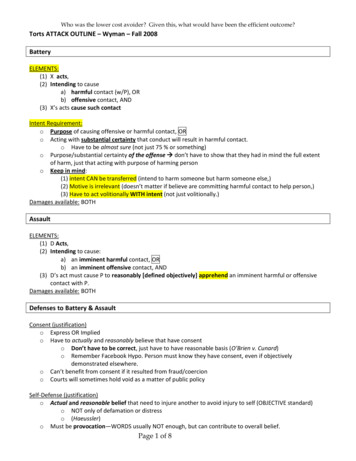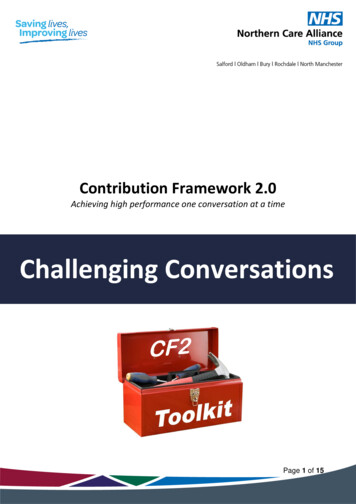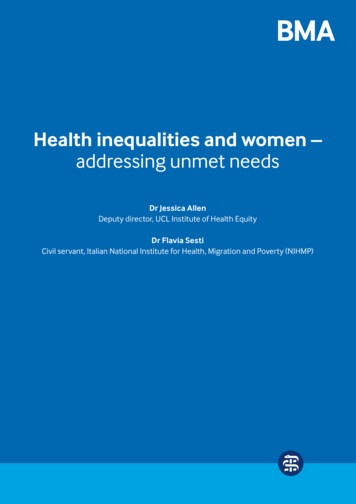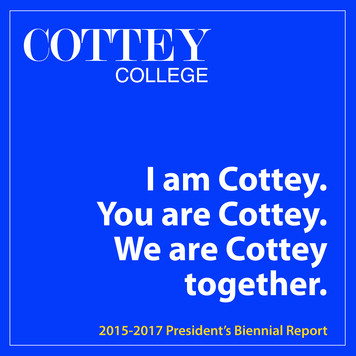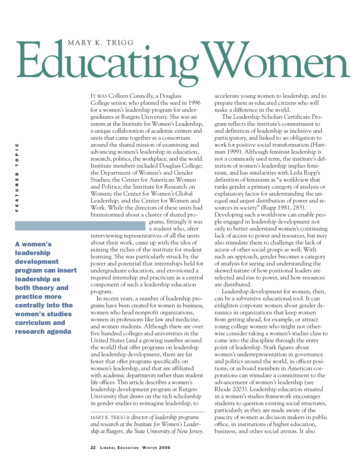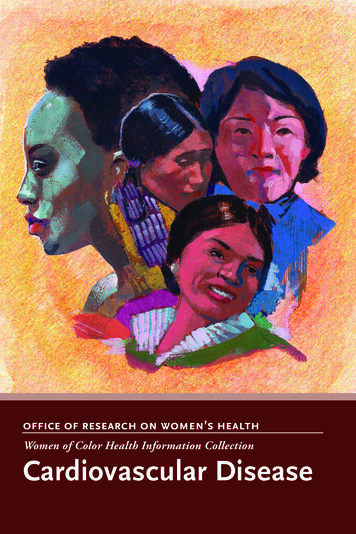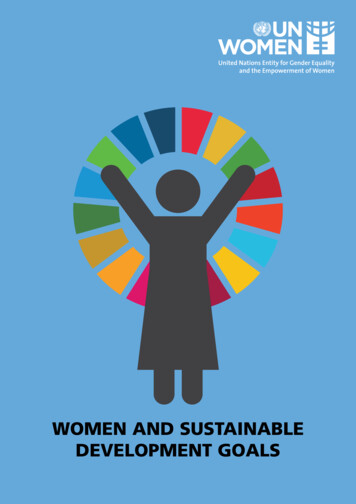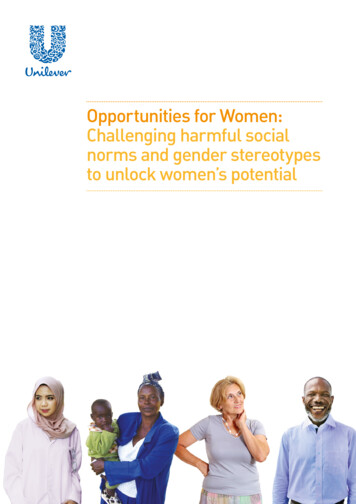
Transcription
Opportunities for Women:Challenging harmful socialnorms and gender stereotypesto unlock women’s potential
ACKNOWLEDGEMENTSWe would like to thank the following colleagues andorganisations for their valuable comments during thepreparation of this paper:African Women’s Development Fund Theo SowaCentre for Social Markets Malini MehraDFID Isabelle Cardinal, Hannah LangfieldLevo League Ellen McKay Lorenzo, Jennifer ZephirinOxfam Alex Lankester, Nikki Van der Gaag, Hina WestPlan International Angela Basso, Gabriella Pinto,Kerry SmithSave the Children Helen Elliott, Claire O’MearaUNICEF Afshan KhanUN Women Laura Capobianco, Tunay FiratVital Voices Alyse NelsonWomen Deliver Katja Iversen, Susan PappWorld Association of Girl Guides and Girl ScoutsAnush Aghabalyan, Nefeli ThemeliWorld Economic Forum Pearl SamandariPRODUCEDby Unilever Chief Sustainability OfficeCONTACTGlobal Partnerships and Advocacy for Womenand no@unilever.comAUTHORSAdrian Hodges Advisory Ltd (AHA Ltd)www.hodgesadvisory.bizDESIGNThe Ayres Design Company Ltdwww.theayres.co.ukPRINTINGScanplus, LondonFEATURE PHOTOGRAPHYUN Women/J Carrier, Melissa Miners, Chris Moyse,Julius Ceaser Kasujja/Oxfam, Symrise AGMarch 201710 9 8 7 6 5 4 3 2
CONTENTSFOREWORD 2PREFACE 3EXECUTIVE SUMMARY 4INTRODUCTION 6UNDERSTANDING THE CHALLENGE 8UNILEVER’S VISION AND COMMITMENT 1201 WORKPLACEEmployment and professional development 1402 SUPPLY CHAIN AND CUSTOMER DEVELOPMENTUnilever’s own operations and extended supply chain operations 18Sales and customer development 2403 CONSUMERSProducts and brands 2804 SOCIETY AT LARGEPartnership, thought leadership and advocacy 34PRIORITIES FOR BUSINESS ACTION: CHANGING THE WAY THE WORLD WORKS FOR WOMENUnilever Opportunities for Women381
FOREWORDThe 2030 Agenda for Sustainable Development, shaped by both public and privatesectors and the voices of civil society, was adopted by world leaders two yearsago as a blueprint for making our world more equitable, sustainable and livable.Its goals and targets are jointly agreed as solutions to the inequality, conflict andunrest that we see worldwide.A key target in the 2030 Agenda is to end all forms of discrimination against allwomen and girls, everywhere. This is so important because of the crushing impactof laws and policies that explicitly restrict women’s ability to engage economicallyand socially, coupled with the less visible but equally powerful cultural and socialnorms that portray women as unequal to men - and make them so in the process.Negative stereotypes of women have become deeply rooted, even in countries withstrong anti-discrimination legislation. Confronting and changing stereotypes istherefore central to evolving how both women and men are able to operate in societyand in the economy. This is a responsibility that touches every facet of people’s lives,from what they see and experience at home, to what they learn at school, and howthey are treated at work or on the street. Everyone has a role in shaping – andre-shaping – those stereotypes. This is a shared goal, whose success has an impacton us all.That is why at UN Women we are working to secure transformative commitmentsfrom partners across governments, corporations, media, and many other sectors toremove structural barriers, discriminatory social norms and gender biases thatimpede women’s ability to engage economically, politically and socially. Part of this isdemonstrating the ways in which women’s representation – or the lack of it –confirms and deepens cultural biases. A major element is also working withpartners like Unilever who are actively seeking to change those biases in their ownplaces of work, and throughout their chain of influence.PHUMZILE MLAMBO-NGCUKAEXECUTIVE DIRECTOR, UN WOMEN2Unilever Opportunities for Women
PREFACEIn many ways, the world in 2017 is freer and fairer than ever before. People havemore freedom to choose the career they dream about and marry the person theylove. Yet there are still many human rights challenges that are limiting our dailylives, and one of them is the inequality of men and women.At the current rate, it will require another 170 years before we have full economicgender equality, according to WEF’s Global Gender Report, taking us all the way to2187. We cannot and should not wait that long. Numerous barriers are preventingwomen from actively participating in the economy and realising their full potential,from discrimination in hiring and unequal pay to the risk of harassment and physicalviolence – underpinned by harmful social norms and gender stereotypes.I’ve always believed that women have been undervalued. When we empower women,society and the economy benefit, grow and thrive. That’s why this topic is called outspecifically in the UN’s Sustainable Development Goal 5. But we also know that Goal5 actually permeates all the others. If we fail to tackle gender inequality, the rest ofthe goals are likely to fail too.Fortunately, the private sector has an opportunity to make a real difference – inemployee policies, in hiring practices and through the value chain. And it makesenormous economic sense too, with an overwhelming number of studies showingtime and time again that gender equality is good for talent development, culture,innovation, leadership and performance.As this report demonstrates, there is no single solution to tackling gender inequality.It requires a holistic approach, from equal pay and representation in our workforceto supporting female smallholder farmers in our supply chain, and ultimately to howwe represent our brands to consumers through removing gender stereotypes.Underpinning these efforts, it’s crucial that we continue to forge and deepenpartnerships that will drive broader systemic change and benefit all women,everywhere.This kind of approach is needed now more than ever. As a society, we remain a longway away from achieving gender equality of outcomes – at home, at work and in thepublic sphere. If business works in partnership with governments and civil societyand leverages the size and scale of global value chains like ours, we can achieve abreakthrough. It isn’t just about empowering women and girls because it’s the rightthing – our vision of a prosperous, poverty-free world depends on it.PAUL POLMANCHIEF EXECUTIVE OFFICER, UNILEVERUnilever Opportunities for Women3
EXECUTIVE SUMMARYGender inequality isnot only a pressingmoral and socialissue. as much as 28 trillion, or 26%,could be added toglobal annual GDPby 2025If present trendscontinue, it will take170 years to reachgender equalityWORLD ECONOMIC FORUMMCKINSEY GLOBAL INSTITUTEToday, women and girls enjoy greater rightsand opportunities than at any time in history –and yet full gender equality remains a distantgoal. Authoritative sources suggest it will take170 years to achieve.It is significant, then, that nearly 200 governmentshave signed up to Sustainable Development Goal(SDG) 5, achieving gender equality and empoweringall women and girls, and have recognised that thisis critical to progress across the entire 2030Sustainable Development Agenda. According to theUnited Nations High-Level Panel on Women’sEconomic Empowerment, “the global commitmentto gender equality has never been stronger”.1Unilever shares this commitment.We recognise that gender equality is first andforemost a matter of human rights. We also believethat increasing gender equality will be one of themost powerful enablers of economic growth andof human development in the coming decades.This is why we have made our ‘Opportunities forWomen’ commitment a key part of the UnileverSustainable Living Plan (USLP), with an initial goalto empower 5 million women by 2020 and anambition to positively impact many more in thefuture in our value chain and beyond. The benefitsfor society are clear, and they will help us growour business.social norms and stereotypes about women andmen. These norms and stereotypes shape theperceived value of girls relative to boys, determinewhat is considered ‘appropriate’ work, burdenwomen with disproportionate shares of unpaidhousehold and family care, normalise the idea thatmen should have control over women’s choices,justify restrictions of all kinds and in some placesappear to sanction violence against women.It is increasingly recognised that shaping moresupportive social norms and challengingoutdated stereotypes will be a powerful driverof progress towards gender equality andwomen’s empowerment. At Unilever, we callthis ‘unstereotyping’, and we believe businesshas a strong role to play.Unilever’s vision and commitmentWe envisage a world in which every woman cancreate the kind of life she wishes to lead,unconstrained by harmful norms and stereotypes.It is a vision in which women and girls have thesame opportunities as men and boys, without fearof prejudice, harassment or violence andregardless of age, race, ethnicity, disability, religionor sexual orientation.Understanding the challengeIt is a vision in which men are free also fromthe confines of adverse social norms andstereotypes of manhood, and in which economiesare growing and creating opportunities for menand women alike.Studies by leading experts, coupled with our ownresearch, suggest that some of the strongestforces behind persistent gender gaps are harmfulWe are working toward this vision by adopting aholistic approach that leverages a full range ofassets and expertise along our extended value4Unilever Opportunities for Women
Changing norms shouldbe at the top of the2030 Agenda to expandwomen’s economicopportunitiesUN HIGH-LEVEL PANEL ON WOMEN’SECONOMIC EMPOWERMENTWe envisage a worldin which every womancan create the kind oflife she wishes to lead,unconstrained byharmful norms andstereotypesUNILEVERchain. We start with progressive policies andpractices in our own workplace and supplychain operations. Building on this foundation,we collaborate with businesses and civil societyorganisations to create opportunities for womenin our extended supply chain, in our sales andcustomer development operations and, viaproducts and brands, for consumers. Byengaging in partnerships, thought leadershipand advocacy across all that we do, we aimto unleash the power of collective action forsustainable, transformational change forsociety at large.We are on track to achieve our initial goal ofempowering 5 million women in our value chainby 2020 via programmes focused on promotingrights and safety, building skills and capabilities,and creating economic opportunity through jobsand livelihoods.Our ambition, though, is much greater.Recognising that harmful norms and stereotypesare a drag on equal opportunity and on the broadersustainable development agenda, we intend toramp up our efforts to ‘unstereotype’ our workplaceand, over time, our extended supply chain andcustomer development networks.In addition, as a leading global consumer goodscompany and one of the largest advertisers in theworld, we have the opportunity to touch the lives ofmillions of people every day. We will activate thepower of our brands by ‘unstereotyping’ ouradvertising and portraying diverse images ofwomen and girls, while collaborating with trustedpartners to cultivate more positive and supportivesocial norms.Priorities for business action: changing theway the world works for womenThe fight for gender equality and women’sempowerment is not Unilever’s alone. Allstakeholders – both individuals and institutions –have roles to play in making the changes necessaryto close persistent gender gaps. We will continue tocollaborate with international agencies, civil societygroups and governments. At the same time, we willleverage our position to promote change in thebusiness community.Drawing on insights and expertise from leadingorganisations, we highlight priority areas foraccelerating gender equality and women’sempowerment in the private sector. Specifically, wecall on business to:¡¡ Be gender aware, by ensuring they have the rightinformation and data in place to inform policies¡¡ Be gender active, by having the right policies andpractices in place that respect women’s rightsand empower professional and personaldevelopment¡¡ Be the new norm, by ensuring that harmfulnorms are not perpetuated through outdatedbusiness practices, while actively promotingmore positive portrayals of women along thevalue chain to challenge stereotypes.We call upon other companies to be part of amovement to make gender equality a reality. Joinforces with us and other businesses in collectiveaction initiatives. Be gender aware. Be genderactive. Be the new norm. Together we can changethe way the world works for women.Unilever Opportunities for Women5
INTRODUCTIONStudies show that women and girls havemade great strides – and yet genderequality remains a distant goal.The World Economic Forum estimates that ifpresent trends continue, it will take 170 years toreach gender equality across economic, political,health and educational dimensions.2It is significant, then, that nearly 200 governmentsaround the world have signed up to the concretegoal of achieving gender equality and empoweringall women and girls by 2030: SustainableDevelopment Goal 5. In addition, they recognise that“gender equality and the empowerment of womenand girls will make a crucial contribution toprogress across all the Goals and targets” ofthe 2030 Sustainable Development Agenda.3According to the United Nations High-LevelPanel on Women’s Economic Empowerment,“the global commitment to gender equality hasnever been stronger”.4Unilever shares this commitment.We recognise that gender equality is firstand foremost a matter of human rightsThe Universal Declaration of Human Rights,adopted by the United Nations in 1948, states that“All human beings are born free and equal in dignityand rights.without distinction of any kind, such asrace, colour, sex, language, religion, political orother opinion, national or social origin, property,birth or other status”.We also believe that gender equalityand women’s empowerment arepowerful enablers of economic growthand human developmentThe McKinsey Global Institute has estimated that ifwomen played identical roles in the labour force tomen – employed at the same rate, for the same6Unilever Opportunities for Womennumber of hours, in the same industry sectors –it would add US 28 trillion, or 26%, to global GDPby 2025.5 Western Europe could increase its GDPby 23% and South Asia by 48%.6 According tobankers Goldman Sachs, the return on investingin women and girls is one of the highest availablein the developing world.7In developing and developed countries alike, genderequality and economic opportunity for women areassociated with higher growth and per capitaincomes. And they trigger a virtuous cycle. Greaterlabour force participation and production generategreater income. Greater income facilitates greaterdemand for products and services. Women, inparticular, spend their income on products andservices that build human capital, laying thefoundations for even greater growth in the future.8Research shows that women reinvest 90% of theirincome into their families, compared to 30–40% formen.9 The impacts are immediate, and they last –improving the health, education and incomes offuture generations.And the business case for Unilever is clearWe depend on women as discerning consumerswith rising incomes and full freedom to choosehow they spend. It is reported that women control64% of consumer spending and are the fastestgrowing group of consumers in the world today.10We depend on women as creative, engagedemployees with the insight to meet the needs of apredominantly female consumer base and theskills and leadership styles to succeed in achanging operating environment.And we depend on women as empowered,sustainability-minded partners in our supplychain and route to market.
Unilever has a long track record ofsupporting different aspects of sustainabledevelopment.Our approach was formalised in 2010 with thelaunch of the Unilever Sustainable Living Plan(USLP), which serves as our blueprint forsustainable growth. The USLP includes threebig goals and sets stretching targets, includinghow we source agricultural raw materials andhow consumers use our brands. USLP activityis aligned with and contributes to the UN SDGs.Many of the programmes in place to deliver againstthese goals engage and positively impact womenand girls, whether through increased access tosafe drinking water, better availability of soap toprevent the spread of bacterial infections, improvednutrition for families or techniques to mitigate theeffects of climate change on smallholder farmers,many of whom are women.In 2014, we made gender equality andwomen’s empowerment a specific part ofthe Unilever Sustainable Living Plan.This paper outlines our understanding of thechallenge and our vision for change. It describesthe holistic approach we are taking to empowerwomen in our extended value chain by promotingrights and safety, building skills and capabilities,and creating economic opportunity through jobsand livelihoods. And it describes our emergingwork to combat the underlying norms andstereotypes responsible for many of the barrierswomen face, thereby driving systemic change thatenhances opportunities for all women, everywhere.The benefits for society are clear, and they willhelp us grow our business.Yet none of this is easy. It requires us to find newways of measuring and managing our social impactcost effectively and at scale. It requires us to findnew ways of partnering with others, includinggovernment and civil society. In particular, itrequires us to harness the collective influenceof the wider business community. In conclusion,the paper highlights three priorities all businessescan pursue to help change the way the world worksfor women.We now have an explicit commitment on womenunder the Enhancing Livelihoods pillar: to empower5 million women by 2020. And our ambition is toempower many more by activating the power of ourbrands and triggering the transformative effect ofcollective action.We call our work in this area ‘Opportunitiesfor Women’.Unilever Opportunities for Women7
UNDERSTANDING THECHALLENGETroubling gender gaps persist aroundthe world, with life-shaping consequencesfor women and men.Girls are still less likely to be in primary schoolthan boys.11 In some places, it is still common tosee child brides. Women are burdened withdisproportionate shares of unpaid care anddomestic work12 and fewer than half have jobs,compared to nearly 80% of men.13Women earn less14 and remain vastly underrepresented in the senior leadership ranks of bothbusiness and government.15 Women trail men inaccess to other services that people need to beproductive, like banking, credit, telecommunications and the internet. Most womenentrepreneurs go into business out of necessity,rather than opportunity, and operate in theinformal, unregulated and unprotected sector.16Women and girls often face sexual harassment inpublic spaces, reducing their ability to participate inschool, work and in public life, limiting their accessto essential services and enjoyment of cultural andrecreational opportunities, and threatening theirhealth and well-being. Many women today are notphysically safe, either in public or in private: anappalling 70% of women around the worldexperience violence at some point in their lives.17husband’s permission, in which it is ‘ok’ thatwomen do two and a half times as much unpaidhousehold and child care work as men,21 while atthe same time increasingly being expected to earna greater share of the family income.22 Whileoutright discrimination is increasingly unacceptableand even illegal in many places, it has simply givenway to double standards and unconscious bias thatreflect and continue to fuel harmful norms andstereotypes.Some of the strongest forces behind thesegender gaps are harmful social norms andgender stereotypes.Harmful norms and stereotypes are deeplyembedded – in law, politics, corporate culture,popular culture, religion, and family life. They arealso deeply psychologically ingrained, rooted in thefierce human desire to belong. People conformbecause they believe most other people conform,and that others think they should conform, too.23The social rewards for doing so – and the socialsanctions for failing to do so – are very real.24A timely report by the UN Secretary-General’sHigh-Level Panel on Women’s EconomicEmpowerment identifies four systemic constraintsfacing women and girls. Adverse social norms is atthe top of the list, and it permeates and contributesto the other three: discriminatory laws and lack oflegal protection; the failure to recognise, reduceand redistribute unpaid household work and care;and a lack of access to financial, digital andproperty assets.18Harmful social norms and the outdated genderstereotypes that accompany them have seriousconsequences for women and girls. They helpcreate environments in which it is considered ‘ok’for husbands to harm their wives,19 in which it is ‘ok’to pay women 20% less than their male colleaguesfor the same job,20 in which it is ‘ok’ that womencannot own land or open a bank account without a8Unilever Opportunities for WomenNorms and stereotypes around womanhood areonly half of the problem; norms and stereotypesaround manhood are also detrimental. Together,they shape the perceived value of girls relative toboys, normalise the idea that men should havecontrol over women’s choices, justify violence andrestrictions on women’s mobility or ability to ownproperty, determine what is considered‘appropriate’ work, and prevent men from taking onequal shares of traditionally female work, whetherin the labour market or in the home. Equally, ideasof male identity will have to change for genderequality to be achieved.
Sound familiar?Many people fail to realise just how muchthey are influenced by social norms andstereotypes, a phenomenon that researcherscall ‘unconscious bias’.Do any of these sentiments sound familiar?nn A woman’s place is in the home Men who show their emotions are not‘real men’n Women are better with childrenn Men don’t cryn Mothers aren’t fully committed to their jobsn Men are better driversnn Women aren’t physically or emotionallystrong enough for some jobs A good man provides for the family and hiswife shouldn’t need to work n W omen should conform to traditional – male– ideals of beauty.People tell us harmful norms andstereotypes affect them every day indifferent ways.In research by Unilever brands, when asked whatconcepts like feminism and gender equality meanto them, women and girls stress that they do notwant to be the same as men and boys. Neither dothey want to be the same as one another. They are aheterogeneous group, and they want to bethemselves – to make their own life choices, bigand small, unconstrained by preconceived notionsof what is and is not ‘ok’.Societal expectations of how women and girlsshould behave and what they should look like canhave serious consequences. Our brands areengaged with women and girls all over the worldwho feel they do not measure up to traditionalstandards of beauty, who feel they have to worktwice as hard to prove themselves and who feelthey have insufficient control over important partsof their lives.“ I am super optimistic about myfuture, but there are invisibleforces in life which I simplydon’t have control over.”YOUNG WOMANUNILEVER CONSUMER RESEARCH“ F rom bosses to husbands,it is still rare to see men whoreally consider that women arepartners in every journey.”BRAZILIAN WOMANUNILEVER CONSUMER RESEARCHThese sentiments and their ramifications areillustrated by findings from interviews Doveundertook with 10,000 women and girls in13 countries over 2015-16, published in TheDove Global Beauty and Confidence Report, 2016.Unilever Opportunities for Women9
UNDERSTANDING THE CHALLENGEThe Dove Global Beauty and Confidence ReportWhen women and girls don’t feel good about the way they look 9 in 10 women8 in 10 girlsopt out of important lifeactivities such as engagingwith friends and loved ones9 in 10 women7 in 10 girlsstop themselves from eatingor otherwise put their healthat risk (e.g. avoid going tothe doctor)6 in 10 womenbelieve social media pressurespeople to look a certain wayhave not been assertivein their opinion or stuck totheir decision7 in 10 women and girls believemedia and advertising set anunrealistic standardof beauty most womencan’t ever achieve7 in 10 women and girlswish the media did abetter job of portrayingwomen of diversephysical attractiveness8 out of 108 in 10 women and girlsfeel under pressure tonever make mistakesor show weakness5 in 10 women7 in 10 girlsEXTRACT FROM THE DOVE GLOBAL BEAUTY AND CONFIDENCE REPORT, 2016In addition, research by the Unilever corporatebrand sought to understand how issues of socialnorms and stereotypes are commonly experiencedby workers around the world, surveying a randomsample of 9,000 employees across differentindustry sectors in eight different countries(non-Unilever employees).Undertaken in association with partner The FemaleQuotient, the research revealed that adverse normsand outdated stereotypes are impeding positivechange at work. Men are increasingly engaged inthe challenge of gender equality on an intellectuallevel, but stereotypes still pose a major problem inpractice. For example, an overwhelming 77% ofmen and a majority (55%) of women believe thatmen are the best choice for high stakes projects.10Unilever Opportunities for WomenSome 60% of women and 49% of men reportedthat stereotypes impact their career, theirpersonal life, or both. For instance, women andmen both hesitate to speak up about workplacediscrimination and inappropriate behaviour.A strong majority (67%) of women feel that theymust simply ‘get over it’. Just over half (55%) of menand even more women (64%) believe that men donot challenge each other when they witness suchbehaviour. Unequal division of housework andchildcare also stifles progress: almost half ofwomen see this as a barrier to attaining equalityin the workplace.
Shaping more supportive social normswill be a powerful driver of progresstowards gender equality and women’sempowerment.Unsupportive social norms and their consequencesare unhelpful to Unilever’s employees andsuppliers and to our business. Female employeesmay have to leave the company because theirpartners’ employers do not offer the flexibility theyneed to fulfill equal shares of the household andfamily care work. We see women running farmswho are unable to borrow funds for productivityenhancing measures because the land required assurety is not registered in their names. Womenshop owners may decide not to attend trainingsessions because they are afraid of being harassedon the journey to the training location.It is instructive then, that a number of internationalorganisations have recently pinpointed shapingmore supportive norms as a priority for action.The World Bank has reported that “gender equalityis about changing the norms and expectationsabout female and male roles and ultimatelychanging power relationships.” 25 The McKinseyGlobal Institute has written that “attitudes andsocial norms exert a heavy influence on genderequality issues and these cannot easily be budged.But acting on this front is a priority if barriers toclosing the gender gap are to be removed.” 26 Andthe UN Secretary-General’s High-Level Panel onWomen concluded that “changing norms should beat the top of the 2030 Agenda.” 27Intervening deliberately to affect norms is notstraightforward. There is a range of broadstructural drivers, including education,demographic and economic change, and legalreform. These combine with individual factors suchas personal beliefs, agency and resilience in theface of negative reactions from others to behaviourconsidered ‘different’. The literature suggests thatleaders, role models and exposure to counterstereotypical images – for example in the media –can all help to change attitudes and expectedbehaviours. It is generally accepted that a societywide approach is needed, including, importantly,among men and boys.At Unilever, we call this ‘unstereotyping’– and we believe business has a strong roleto play.Companies have a significant impact on the lives ofemployees who may spend large proportions oftheir waking hours at work, on the entrepreneurswho depend on securing business orders tosupport their families, on the consumers who seeand hear advertising virtually every day. Fromrecruiting and employment to procurement andsales, to marketing and advertising, companieshave a wide range of levers they can use to cultivatemore positive and diverse images of women andenable new behaviours that level the playing fieldfor all.Social norms are considered in a constant state offlux, as they are shaped by human interaction. Insome societies, for example, gender is alreadystarting to be viewed and embraced as fluid, withnascent acceptance of those who do not conform tostandard definitions of male and female.“ Stereotypes and social norms have a huge impact on genderequality issues globally. Whether consciously or unconsciously,we are all subject to the biases in our mindsets. Our view,informed by our research and direct experience, is that findingways to ‘unstereotype’ mindsets and ‘unstereotype’ our valuechain will be key to making equal opportunity the new norm.”KEITH WEED CHIEF MARKETING AND COMMUNICATIONS OFFICER, UNILEVERUnilever Opportunities for Women11
UNILEVER’S VISION ANDCOMMITMENTUnilever envisages a world in which every womancan create the kind of life she wishes to lead,unconstrained by harmful norms and stereotypes.It is a vision in which women and girls have the sameopportunities as men and boys, and can chooseamong them without fear of prejudice, harassmentor violence, regardless of age, race, ethnicity,disability, religion or sexual orientation.A visi
women and girls, everywhere. This is so important because of the crushing impact of laws and policies that explicitly restrict women’s ability to engage economically and socially, coupled with the less visible but equally powerful cultural and social norms that portray women



